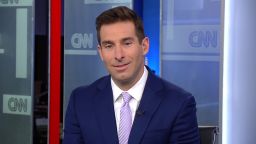Editor’s Note: In this new weekly column “Cross-exam,” Elie Honig, a former federal and state prosecutor and CNN legal analyst, gives his take on the latest legal news and answers questions from readers. Post your questions below. The views expressed in this commentary are his own. View more opinion articles on CNN. Watch Honig answer reader questions on “CNN Newsroom” at 5:40 p.m. ET Sundays.
Here we go. Just days after Michael Cohen’s explosive congressional testimony, Rep. Jerrold Nadler, chairman of the House Judiciary Committee, issued a wave of letters seeking information from 81 – yes, 81 – people and organizations. Nadler’s requests mark the opening salvo in what promises to be a heated legal and political battle between the White House and Congress.
Nadler’s opening gambit is more sledgehammer than scalpel, carrying risks and potential rewards. Strategically, the requests lack a coherent topical focus. Nadler could find himself buried in irrelevant materials and, ultimately, bogged down in litigation over whether and to what extent parties must produce evidence to him.

On the reward side, however, you’ll never know if you don’t ask. By serving requests to nearly every person in Trump’s orbit, Nadler ensured that he will have plenty of raw materials to work with. This is often how criminal investigations work: Gather all the material possible, then winnow it down to the most relevant and probative information upon which to assess potential charges.
Politically, Nadler served notice that he does not intend to take half-measures and that he is spoiling for a fight. On the other hand, Nadler’s broad-based approach left the political door swinging wide open for Trump and those around him to decry the investigation as an unfocused, over-broad “big fat fishing expedition” and, of course, to reprise the familiar “witch hunt” rallying cry.
Ultimately, we should expect this battle to land in the courts. Congress may step up its tactics from informal letters (which politely but firmly request the recipient to provide information) to subpoenas (which compel the witness to provide information, like it or not). Subpoena recipients in and around the White House, in turn, may resist by invoking executive privilege – arguing essentially that internal communications between the President and his advisers are confidential and protected from disclosure.
All this could culminate in the most consequential legal battle over executive privilege since the Richard Nixon case in 1974. The Supreme Court unanimously rejected Nixon’s executive privilege claim over tape recordings of internal White House conversations; Nixon resigned 16 days after losing the decision.
Now, your questions
Linda, Maryland: It’s inevitable that [former Trump campaign chairman Paul] Manafort will be sentenced to do time. But how much time do you think he will get?
Manafort faces his first of two sentencings on Friday in the Eastern District of Virginia, where he was tried and convicted on eight counts of tax fraud and bank fraud. (He then will be sentenced on March 13 in Washington for two additional conspiracy crimes, where he faces a maximum sentence of 10 years).
In the Virginia case, Mueller’s team has calculated a sentencing guidelines range of 235 months (19 years and seven months) to 293 months (24 years and five months). The judge must consider the guidelines but may sentence within the range, above it or below it – at his discretion.
Mueller has submitted a scathing sentencing memo, arguing that Manafort behaved “for more than a decade as if he were above the law,” committed “brazen” frauds and acted “for no other reason than greed.” That said, a sentence of 19-plus to 24-plus years feels a bit draconian for a 69-year-old, first-time, nonviolent offender.
I feel no sympathy whatsoever for Manafort; I just don’t see Judge T.S. Ellis imposing effectively a life sentence here. My prediction: Ellis imposes a stern sentence, below the guidelines range but still in low double-digit years – something in the 12 to 14-year range. Stay tuned on Friday.
Ruben, California: Will the House committees interview the people Cohen mentioned in his testimony?
Absolutely. House Democrats have made clear they intend to follow up on Cohen’s testimony, just as any criminal investigator would follow up on any interview – tracking down new leads and speaking to other people who might have relevant information. As discussed above, Nadler’s Judiciary Committee has requested information from numerous people and entities including the White House, Department of Justice and various senior Trump campaign officials.
The Intelligence Committee, led by Rep. Adam Schiff, will question Felix Sater – a Trump associate with a prior conviction related to Russian organized crime who worked on the Trump Tower Moscow project – next week, on March 14. And Rep. Elijah Cummings announced the Oversight Committee would seek interviews with several people mentioned by Michael Cohen in his testimony, including Trump Organization CFO Allen Weisselberg, Donald Trump Jr. and others.
Christopher, Virginia: Why didn’t the House Democrats give their allotted Michael Cohen questioning time to the one representative asking hard questions: Rep. Alexandria Ocasio-Cortez?
Ocasio-Cortez gets my Honorary Prosecutor Award for her examination of Cohen. While some representatives wasted time grandstanding or asking useless generalized questions, Ocasio-Cortez asked questions that were specific, targeted and strategic. She focused on Trump’s (1) potential understatement of assets to commit tax fraud and (2) potential overstatement of assets to commit insurance fraud, asking Cohen about his own knowledge of the schemes and about exactly where investigators might find additional information. On Tuesday, CNN reported that the latter line of questioning may already have resulted in issuance of subpoenas by the New York State Department of Financial Services relating to Trump’s insurance policies.
Given Cohen’s ongoing cooperation, the Southern District of New York may already have been working on these leads (if not, they will be now). Both schemes that Cohen described under questioning by Ocasio-Cortez look like garden-variety financial crimes that the SDNY routinely investigates and, if proven, prosecutes. It doesn’t get much more basic than undervaluing assets to avoid taxes or inflating assets to pump up insurance payouts. (Trump has denied liability and attacked Cohen as a liar after his congressional testimony.)
Gene, Massachusetts: Can Congress enact a law that requires the Mueller report to be made public?
Yes, but easier said than done. Legislation requiring full public disclosure of the Mueller report would need to pass by a majority in both the Democratic-controlled House (likely) and the Republican-controlled Senate (less so). Even if a disclosure bill got that far, Trump could veto it, which seems all but assured given his intensifying attacks on Mueller. Just last weekend, Trump launched a blistering (and largely untrue) assault on the motives and independence of Mueller’s team. It would take a two-thirds majority in both houses of Congress to override a presidential veto, which almost certainly won’t happen, particularly in the Republican-controlled Senate.
John, New York: Why did Trump break up the payment to Cohen the way he did? Why not just pay in full?
While the signed check from Trump to Cohen for $35,000 is powerful evidence that Trump knew about and participated in the hush-money payment scheme, it is not quite a smoking gun.
Cohen testified the check was one of several installments to reimburse him for the $130,000 total hush money payment to Stephanie Clifford. The New York Times now claims to have copies of six other checks.
There’s a reason why, in my view, Trump broke the payments into pieces rather than one lump sum. It would be exceedingly difficult to explain away a one-time check for $130,000, but a series of smaller checks can be seen as a series of innocuous retainer payments from client to attorney for legal services. Indeed, Rudy Giuliani already has said just that.
Cohen testified the payments were broken up precisely to provide Trump with deniability; the retainer story is the cover story. In my view, Cohen’s testimony seems credible and logical. But by structuring the transaction in pieces rather than a lump sum, Trump has at least given himself a reed – albeit a thin one – to cling to.
Gilda, Florida: If Mueller finds information about illegal activities carried out by Trump and/or any of his cohorts that, although not directly related to the Russia probe, is relevant to any other investigation(s) being carried out by congressional committees, can he legally share such information with said committees?
While Mueller certainly can share some of his information with congressional committees, there is a difficult legal question about whether Mueller can share grand jury materials – meaning information he obtained through a subpoena, including documents and witness testimony. Grand jury proceedings typically are secret and cannot be disclosed to anybody other than the approved prosecutors and law enforcement officers on the case.
Perhaps, in anticipation of this scenario, the Congressional Research Service conducted a detailed study of the issue in January. The study concluded that Congress can receive grand jury materials under either of two exceptions: in connection with another judicial matter or proceeding, or in special or exceptional circumstances. Given the extraordinary stakes here, and the ongoing congressional investigations, I see a strong argument that Mueller can and should turn over grand jury materials to Congress if those materials fall outside his mandate and are relevant to a congressional inquiry.
3 questions for next week:
1) Will the White House push back on the onslaught of House subpoenas by invoking executive privilege or other legal objections?
2) Will Judge Amy Berman Jackson in Washington rule that Roger Stone’s upcoming book publication violates the gag order and, if so, will the judge revoke bail and send Stone to prison to await trial?
3) Will Jackson pile any more time on top of whatever sentence Manafort receives this week in the Eastern District of Virginia?








